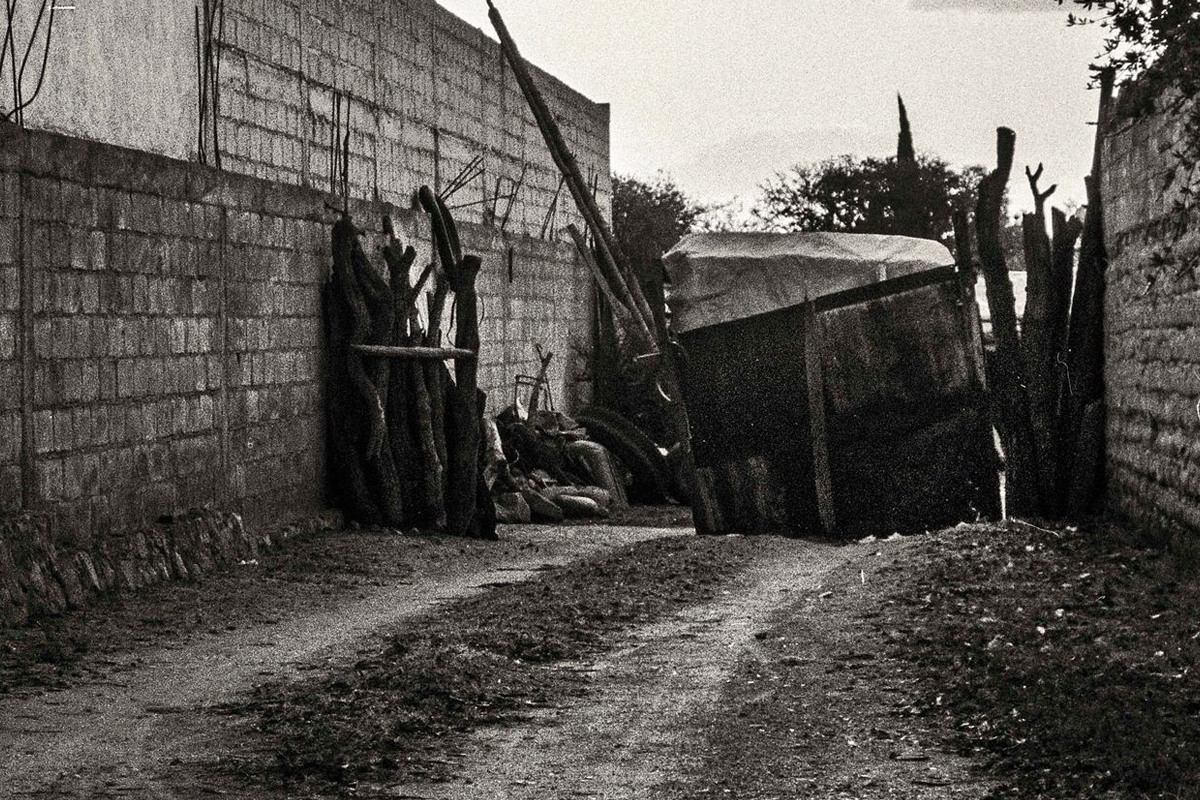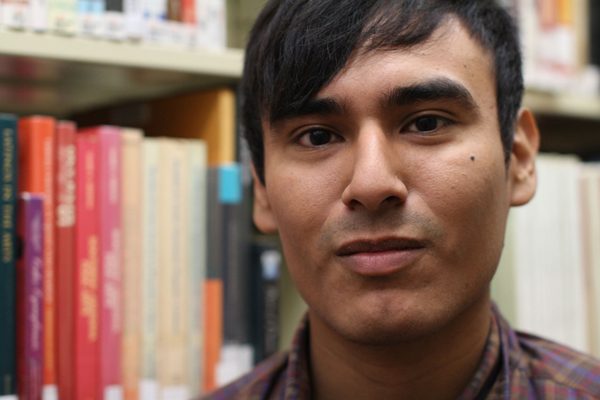In The Company of Memories

A long crackled road runs through a small collection of houses, a village far from any city. The sky above this village is light gray during winter and the fields of green crops are now dry and faded yellow.
On one quiet street sits an orange adobe, home to an elderly couple. He sits at the kitchen table drinking coffee with a crinkled newspaper by his side; she spends her day lying in a bed in the next room.
Margarita has been resting in this frigid room for weeks now. The glow from an unwatched television is the only illumination. She has lived in this house for most of her life, in this farming town two hours from the state’s capital. Opportunities are scarce, and most of the people she knows have left in hopes of a better future elsewhere. Relatives occasionally visit, but Margarita finds herself mostly alone, in the company of memories common to a woman her age.
By closing her eyes she transports herself to another time. It helps distract her from more recent events.
Life has always been difficult here alongside her husband, Sergio, and he’s not making these last days any easier. Excruciating stomach pain, that’s what led to the hospital visit. She learned of her illness from him that day. Beginning to feel ill, she was resting in this very bed when she heard him bickering with one of their daughters.
“You’ve got to come quick, my mother is still feeling really sick!” their daughter said.
“Shut up, woman!” Sergio replied. “The doctor already said that it’s cancer; there isn’t any hope for her!”
His words bruised more than any of his blows, hurt more than his adultery, said more than any of his drunken confessions.
She has been in this room ever since. At the mercy of time.
“It was never part of my plan to come back,” she thinks.
Years before, she had traveled to East Los Angeles. A time in her life that shines brighter than any other. She spent an entire year in the United States, and there she was reunited with seven of her nine children. She worked, made her own money, and found a safe haven from the abuse of the man she married at sixteen.
She was not driven there by the promise of money or a better life. She wanted only to attend the wedding of a son, so she spent three days on a cramped bus to Baja California. The journey up north was made easy by the human smugglers who were then abundant in her town. Laura, a woman from her hometown, met her at the bus station. Small in stature, large in confidence, the young Laura was an experienced human smuggler, and that day she was Margarita’s guide.
“Don’t worry about a thing, Ms. Mago. We’ll cross today, stay the night in a house nearby and we’ll leave for L.A. first thing in the morning.”
Margarita ceased trembling. She could already see her children’s faces.
Laura and her group of smugglers had a routine that earned them an admirable reputation in the business. Back then the U.S./Mexico border was easier to cross. Other migrants struggled through hills and deserts; Laura’s expensive services required less physical strain.
At dawn they gathered the small group of migrants at a truck parking lot in Tijuana. Margarita could see Laura’s breath as she gave instructions. They were taken to a less secured part of the border. All it took was a leap over a wall, and they were on U.S. soil. A few minutes’ walk away Laura’s men were waiting in a van. They drove to a safe house in San Ysidro where they spent the night. The checkpoints were the only concern now. But the smugglers had learned what time of day the highways were less patrolled. A few hours later, Margarita was in Los Angeles.
She arrived with days to spare before the wedding. A great number of people attended. She found herself surrounded by relatives she hadn’t seen in years. The grin on her son’s face was unerasable that day. Margarita was awed by her daughter-in-law’s elegant white dress and stared at it with some envy.
“What a difference,” she thought, remembering her marriage to Sergio. They were kids and had been seeing each other for some time, when one day they decided Margarita would move in with Sergio without her parents’ consent. It was a rebellious method of matrimony practiced frequently in Mexican small towns. “Stealing a wife,” people called it.
Sergio waited outside of her school on her last day. She left with him still wearing her school uniform, trading in the life of a student for that of a wife. There was no graceful white dress; no adoring relatives. Together they walked on the dirt path that led to their new life.
“It wasn’t anything like a real wedding, not like this” she murmured. This was heavenly.
She now wanted to stay in Los Angeles. It didn’t matter that she didn’t understand the country’s language, or that her obligations at home would be ignored. All she wanted to do was pursue a more comfortable life here, near her children.
She still prides herself in the job she found: Babysitting children and getting paid quite well for it; much more money than she had seen back home. With the money earned, she’d take the bus down Whittier Boulevard and get off on Ferris Avenue to visit her sister-in-law – Sergio’s sister – one of her closest friends. Together they would go to shopping centers, grab a bite to eat, and spend hours talking.
In East L.A., she was again surrounded by her children who had left Mexico young to find work. She could never hide her pride in them. They worked tirelessly, starting families, and none possessing a single vice. Margarita prepared their meals before they headed out to work, as she had when they were kids. They always appreciated her labor, especially her first born, Daniel. Her connection with Daniel was different than the one she had with the rest of her sons. He was the oldest, and thus the authority figure among his brothers and sisters.
Margarita lived in his house in East L.A. and spent more time with him than with the others.
With her children and grandchildren, she would attend church every Sunday, and go out for a day in the city afterwards. Daniel and the rest of her children were her strength and support, and they continued to be so even after she had returned to Mexico.
She remembers when their existence had kept her alive back in the village. She had heard rumors of Sergio having an affair with another women, so she followed him one day and furiously confronted him at the home of his mistress. Sergio was not ashamed. Instead, in a fit of rage he forced Margarita into his truck and drove off. He shouted obscenities at her as he drove, telling her she had no right to offend his mistress, that she was just jealous of not being a real woman like his girlfriend. Margarita shouted in return. Sergio threatened to kill her. He drove to the isolated hills far outside the town.
“I’m going to end you right here!” Sergio yelled.
“Well, wait until your kids find out, just wait until Daniel finds out what you did to me. Let’s see how you deal with them!”
Sergio stopped the car, froze for a few seconds, forced Margarita out of the car, and drove off, leaving her miles from home.
Years later, in this room in her house in the village, she still thinks of her children, still misses her life with them, far from here.
It wasn’t her idea to come back. Sergio’s phone calls became insistent.
“What are you thinking? You’ve been over there way too long. I need you back.”
Her children asked her to stay, but she gave in to Sergio’s demands. She boarded a plane and headed back.
Now she’s lost track of the years that have passed since she last saw her children.
Her movements on this bed are limited. Each time she shifts, the creaking of the bed echoes through the empty room; but otherwise, it’s silent.
She has taken all the doctor’s medication, but that burning pain that started in her stomach has now spread through her body, and she hasn’t been able to empty her bladder since last night. All she does now is remember.
Then she is roused from her reverie. Footsteps draw near. She opens her eyes. She is no longer remembering but alive in the moment. Shoes scrape the dirt floor. Her door opens and she hears Daniel’s voice.
“Mom, I’m here.”

December 7, 2014










